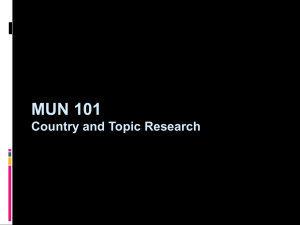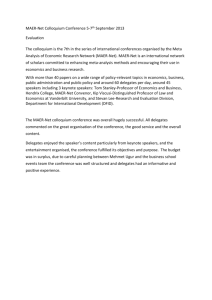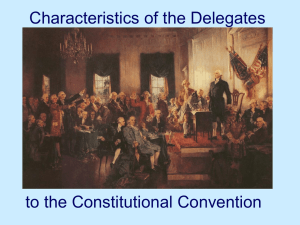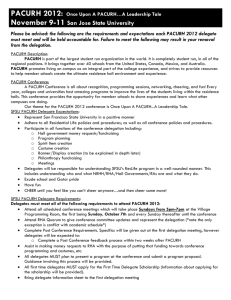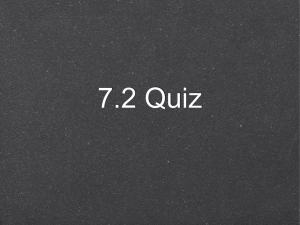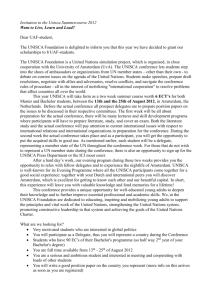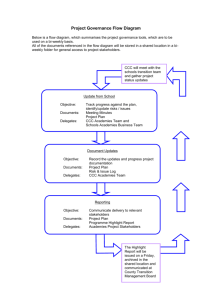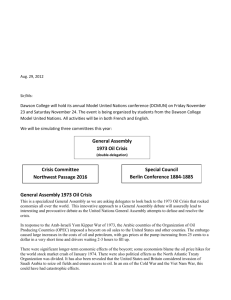Invitation Letter
advertisement
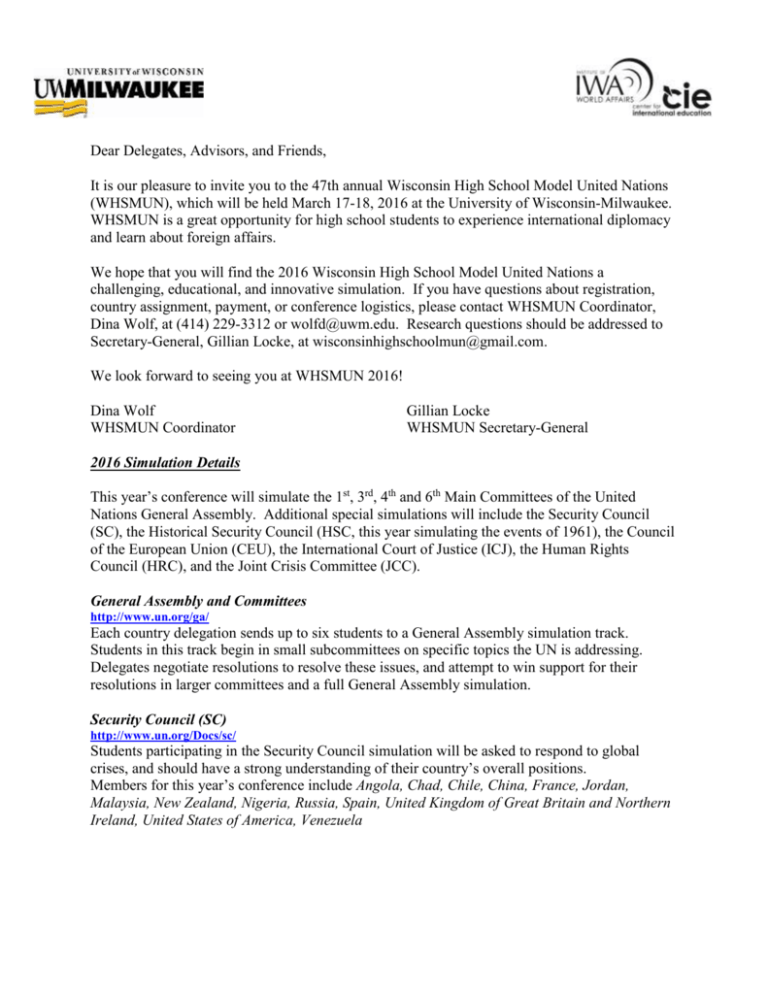
Dear Delegates, Advisors, and Friends, It is our pleasure to invite you to the 47th annual Wisconsin High School Model United Nations (WHSMUN), which will be held March 17-18, 2016 at the University of Wisconsin-Milwaukee. WHSMUN is a great opportunity for high school students to experience international diplomacy and learn about foreign affairs. We hope that you will find the 2016 Wisconsin High School Model United Nations a challenging, educational, and innovative simulation. If you have questions about registration, country assignment, payment, or conference logistics, please contact WHSMUN Coordinator, Dina Wolf, at (414) 229-3312 or wolfd@uwm.edu. Research questions should be addressed to Secretary-General, Gillian Locke, at wisconsinhighschoolmun@gmail.com. We look forward to seeing you at WHSMUN 2016! Dina Wolf WHSMUN Coordinator Gillian Locke WHSMUN Secretary-General 2016 Simulation Details This year’s conference will simulate the 1st, 3rd, 4th and 6th Main Committees of the United Nations General Assembly. Additional special simulations will include the Security Council (SC), the Historical Security Council (HSC, this year simulating the events of 1961), the Council of the European Union (CEU), the International Court of Justice (ICJ), the Human Rights Council (HRC), and the Joint Crisis Committee (JCC). General Assembly and Committees http://www.un.org/ga/ Each country delegation sends up to six students to a General Assembly simulation track. Students in this track begin in small subcommittees on specific topics the UN is addressing. Delegates negotiate resolutions to resolve these issues, and attempt to win support for their resolutions in larger committees and a full General Assembly simulation. Security Council (SC) http://www.un.org/Docs/sc/ Students participating in the Security Council simulation will be asked to respond to global crises, and should have a strong understanding of their country’s overall positions. Members for this year’s conference include Angola, Chad, Chile, China, France, Jordan, Malaysia, New Zealand, Nigeria, Russia, Spain, United Kingdom of Great Britain and Northern Ireland, United States of America, Venezuela Historical Security Council (HSC) 1961 http://www.un.org/Docs/sc/ Delegates on the Historical Security Council (HSC) research their country’s positions on issues before the Security Council in the past. Like the Security Council simulation, delegates to the HSC should have a solid foundation in their country’s positions on a wide range of topics during the selected period. The 2016 HSC will focus on the year 1961, and will include the following countries: Ceylon, Chile, China, Ecuador, France, Liberia, Turkey, Union of Soviet Socialist Republics, United Arab Republic, United Kingdom of Great Britain and Northern Ireland, and the United States. Council of the European Union (CEU) http://www.consilium.europa.eu The Council of the European Union is the main decision-making body of the EU, and the only simulation at WHSMUN that is not part of the United Nations System. Delegates to the CEU negotiate responses to issues of particular concern to European Union members. The following countries will be represented on the Council of the European Union at the conference: Austria, Belgium, Bulgaria, Croatia, Cyprus, Czech Republic, Denmark, Estonia, Finland, France, Germany, Greece, Hungary, Ireland, Italy, Latvia, Lithuania, Luxembourg, Malta, the Netherlands, Poland, Portugal, Romania, Slovakia, Slovenia, Spain, Sweden, United Kingdom of Great Britain and Northern Ireland. Human Rights Council (HRC) http://www2.ohchr.org/english/bodies/hrcouncil/ The Human Rights Council is an inter-governmental body within the United Nations that focuses on the protection and promotion of human rights. Delegates to this simulation will deal with cases in which there has been a possible breach of international human rights law. Schools representing the following countries can only send one delegate to the Human Rights Council simulation: Albania, Algeria, Argentina, Austria, Bangladesh, Bolivia, Botswana, Brazil, China, Congo, Cote d’Ivoire, Cuba, El Salvador, Estonia, Ethiopia, France, Gabon, Germany, Ghana, India, Indonesia, Ireland, Japan, Kazakhstan, Kenya, Latvia, Macedonia, Maldives, Mexico, Montenegro, Morocco, Namibia, the Netherlands, Pakistan, Paraguay, Portugal, Qatar, Russian Federation, Saudi Arabia, Sierra Leone, South Africa, South Korea, United Arab Emirates, United Kingdom of Great Britain and Northern Ireland, United States of America, Venezuela, and Viet Nam. Joint Crisis Committee (JCC) – The Korean War (1950) with South Korean vs. North Korean Forces The Joint Crisis Committee (JCC) gives delegates the opportunity to experience the aftermath of World War 11 and the beginning of the Cold War through the Korean War. Delegates will have the opportunity to work on one of two committees, the Republic of Korea Army (South Korea) or the Korean People’s Army (North Korea). Delegates will have the unique opportunity of exploring the conflicting interests of the two entities, while experiencing the geopolitical tensions of the day. In the RKA and KPA, there will be up to 12 delegates, totaling 24 delegates for the JCC. International Court of Justice (ICJ) http://www.icj-cij.org/ Delegates to the International Court of Justice (ICJ) serve as Justices, hearing cases of international law. Participants are expected to be independent and impartial, and do not represent the interests of a country delegation. There are a maximum of 15 delegates participating in this simulation. Application Details Conference fees per delegation: General Assembly (8 delegates) General Assembly and One Council (9-10 delegates) General Assembly and Two Councils (11-12 delegates) General Assembly and Three Councils (13-14 delegates) General Assembly and Four Councils (15 delegates) Delegate seat on International Court of Justice Delegate seat on Joint Crisis Committee $165 $175 $185 $195 $205 $10 $10 Application deadline: November 6th, 2015 (*Please note there is a possibility of reaching registration capacity before the November 6th deadline. Any applications received once we’ve reached capacity, and/or after the registration deadline, will be accepted only if space is available.) A matrix listing the numerical requirements of each delegation is available at www.modelun.uwm.edu. Please consult this carefully when registering. Each General Assembly country’s delegation is composed of six students. Please note that no more than one representative per country may be present on a given subcommittee. If you choose a country that is on the Security Council or Historical Security Council, please do so with the understanding that you must send two delegates to each of those simulations. Either one or two delegates can be sent to the Council of the European Union and only one delegate can be sent to the Human Rights Council. Each school will have the option to send one student to take part in the International Court of Justice simulation, but space is limited. Furthermore, all delegates to special simulations are expected to participate for the entire duration of the 2-day conference. Countries will be assigned based on the order in which they are requested, with schools earning delegation awards last year receiving priority consideration. Notification of nation and subcommittee assignments begins on November 23rd - December 4th. Conference Preparation: Detailed information on all conference activities and procedures will be provided in a Delegate Handbook which will be available online by November 3rd, 2015. The Handbook includes an extensive research guide and background information for each General Assembly topic. Background guides will be sent for all other simulations by January 29, 2016. Faculty advisors may also assist delegates in preparing for the conference by consulting the United Nations Association website, www.unausa.org. The website offers a Model UN preparation guide, with materials on research, position papers, and writing resolutions. It is suggested that students begin preparation and background research upon receiving delegation and subcommittee assignments. Each delegate will be expected to submit a position paper summarizing his or her nation’s position on an assigned issue by March 2nd, 2016. More information will be provided in the WHSMUN Handbook.
